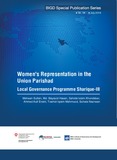| dc.description.abstract | There is a need for in-depth analysis of women’s experience in local government and their ability to exercise political agency (i.e., what women do, how they exercise power) to negotiate local level politics and various barriers. While there is an understanding of the barriers women face and the limitations of how they are able to exercise leadership, less is known about how, when, and in which areas they do exercise agency and can influence structures, processes and people to bring about change or make decisions in their favour. The study aimed to address this gap. It focused on a few key questions: a) how, where and when women receive support for their accession and practice of political leadership at the local level; b) how women engage with opposition (from the family, community, political parties, from the rest of the UP members) in such a process; c) the kinds of coalitions women representatives form as they try to promote their political agenda once they are in power and the strategies they follow and negotiations they make to further their objectives; d) what is women’s experience in negotiating local bureaucracy and political power structures; e) how people perceive women’s leadership at the local level (citizens, local administration, NGOs, political actors). The study investigated experiences of women who have been elected in the UPs at least once and also women who have decided not to run for elections. It also explored the relationships between women in local government bodies, with local political parties, local level UP representatives (UP Chair, members) and other civil society groups such as NGOs and women’s organizations. The study concluded that reserved seats are necessary to ensure women’s participation as both the women candidates and the voters are not willing to consider general seats for them. While capacity development is important, it is insufficient for women to contest local elections and play an effective role in the local government bodies. | en_US |

